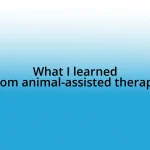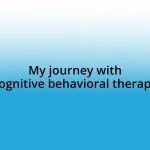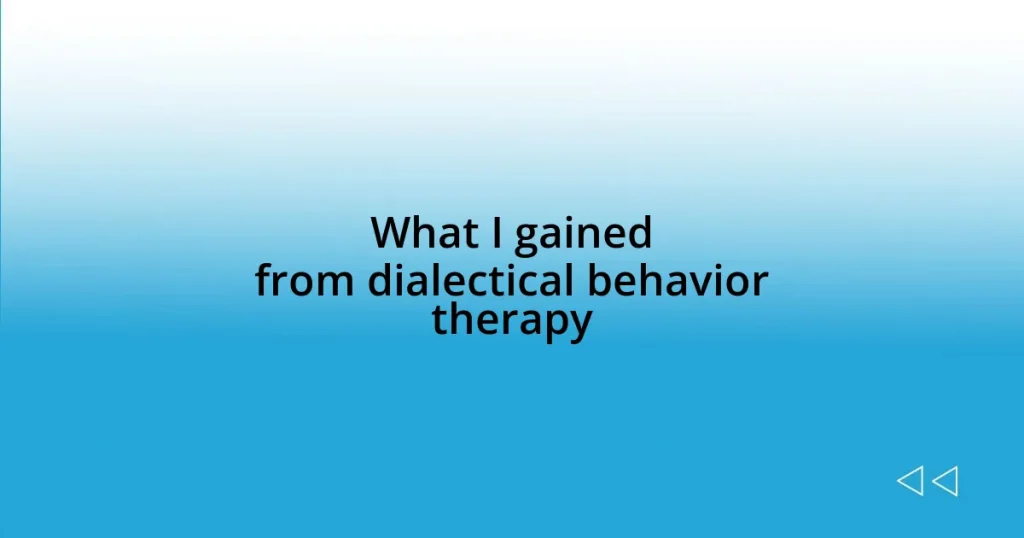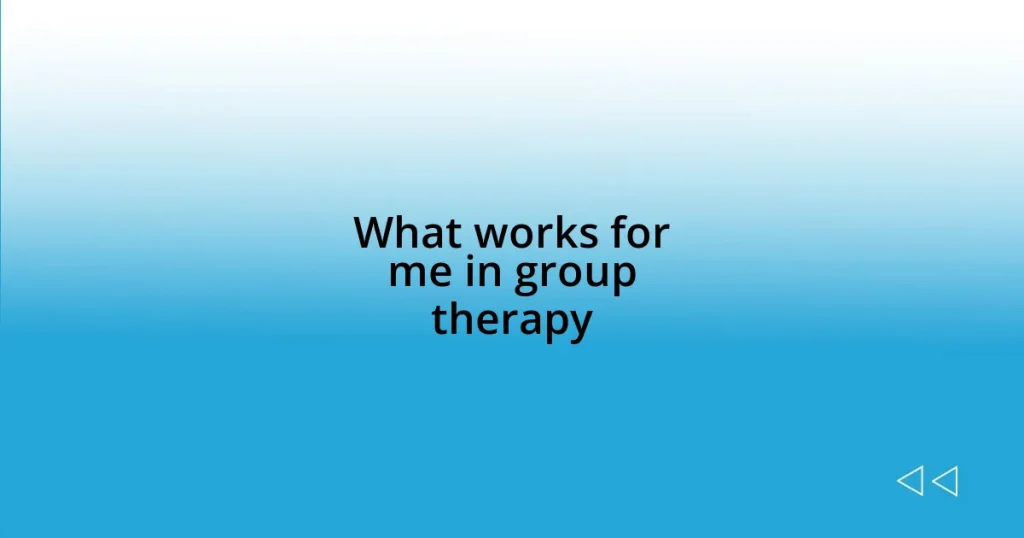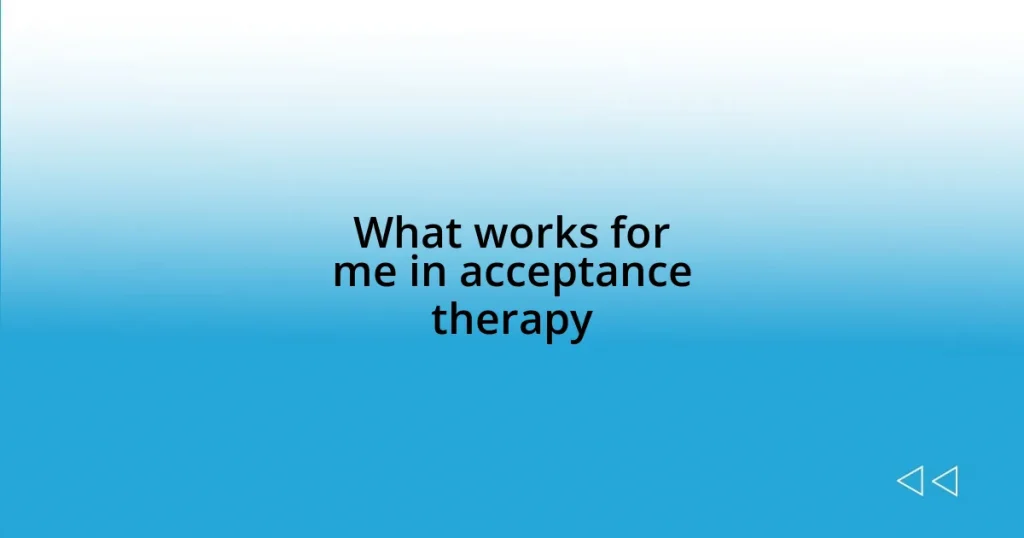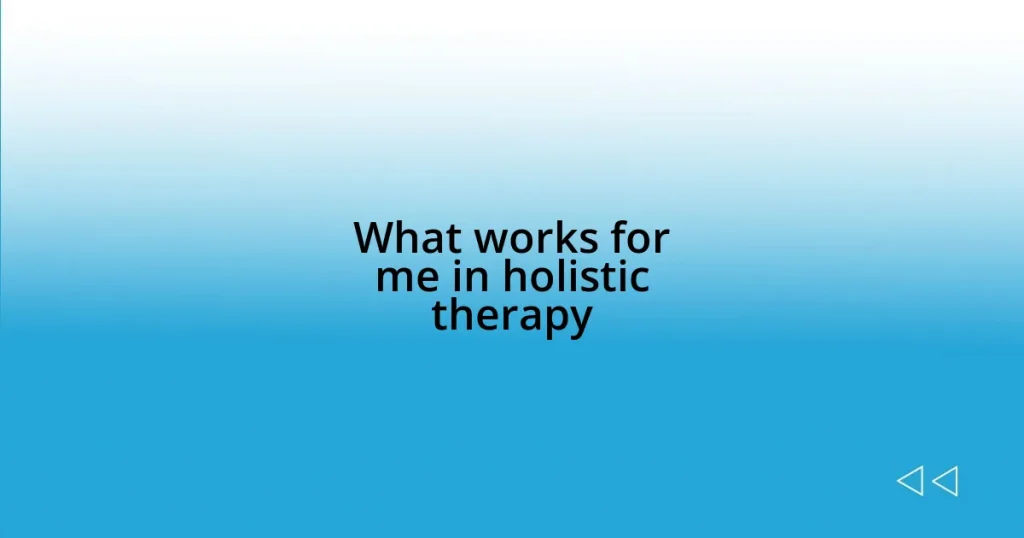Key takeaways:
- Dialectical Behavior Therapy (DBT) emphasizes balancing acceptance and change, empowering individuals to manage overwhelming emotions.
- Key skills learned in DBT include mindfulness, distress tolerance, and interpersonal effectiveness, which reshape coping strategies and emotional responses.
- Long-term benefits of DBT include enhanced emotional resilience and improved relationships through better communication and self-awareness.
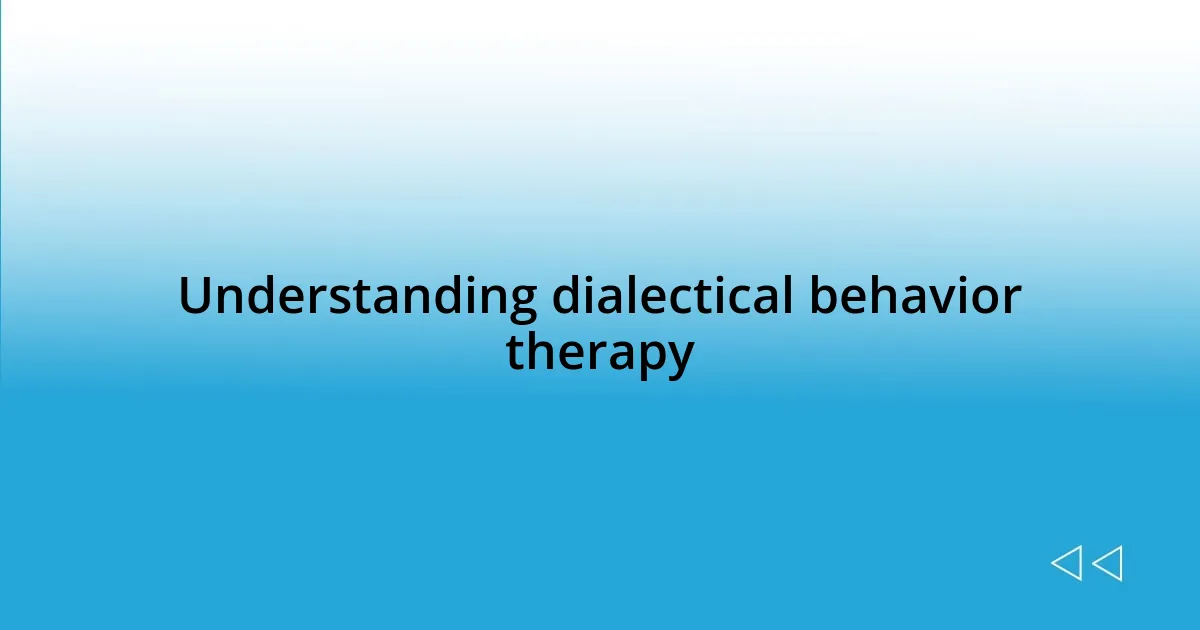
Understanding dialectical behavior therapy
Dialectical Behavior Therapy (DBT) is a unique form of cognitive-behavioral therapy developed by Dr. Marsha Linehan, primarily aimed at helping individuals with emotion regulation and interpersonal challenges. I remember my initial skepticism about whether therapy could genuinely change anything for me. It turned out that the structured approach of DBT, with its focus on mindfulness and acceptance, offered me tools I never thought possible for managing overwhelming emotions.
At its core, DBT emphasizes the balance between acceptance and change. I often found myself wrestling with feelings of anger and sadness, questioning why these experiences seemed insurmountable. What if I could accept my feelings without feeling overwhelmed by them? It’s this balance that fosters a sense of self-empowerment, allowing us to acknowledge our emotions while also taking actionable steps toward change.
One of the most profound aspects of DBT is its application of skills training, which covers areas such as distress tolerance and emotional regulation. Reflecting on my journey, I can still vividly recall learning the ‘TIPP’ skills for managing intense emotions and feeling an immediate sense of relief. What would it feel like to have tools readily available during those emotional storms? This empowerment has reshaped my understanding of coping, allowing me to face challenges with a newfound resilience.
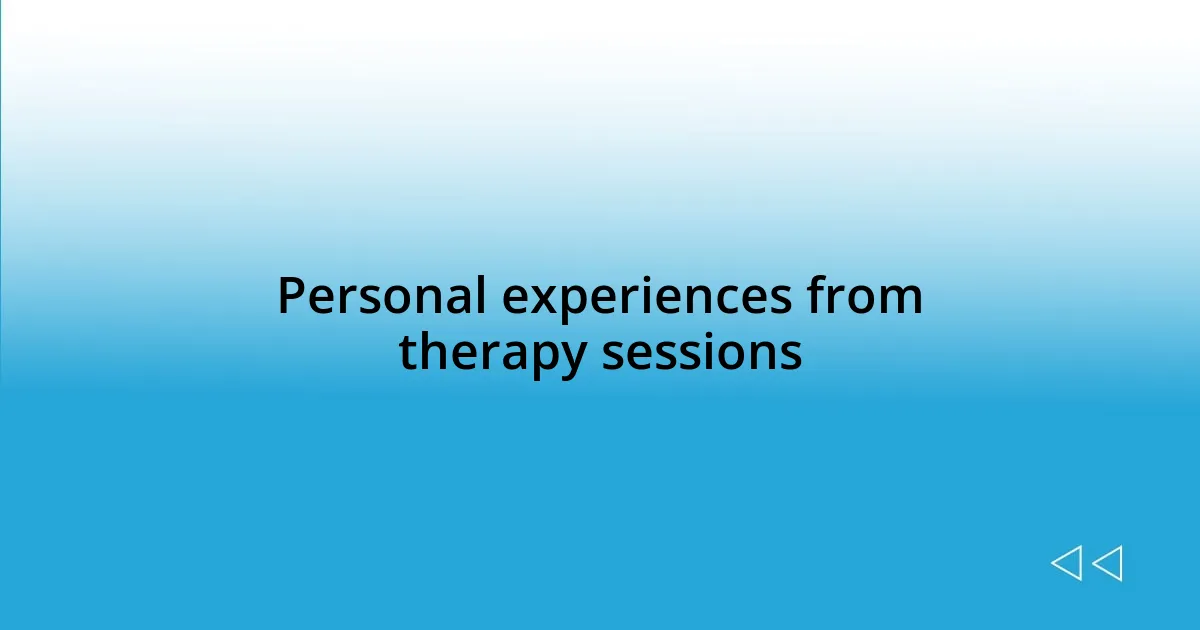
Personal experiences from therapy sessions
During my DBT sessions, each encounter was like peeling back layers of a complicated onion. I remember one particular session where I was struggling with feeling abandoned by a close friend. My therapist guided me through a role-play exercise, which felt awkward at first but ultimately opened my eyes to the power of communication. I realized that addressing my fears directly could mend misunderstandings rather than letting them fester. This experience taught me that vulnerability, though scary, can lead to deeper connections.
- I learned the importance of self-validation while discussing moments of self-doubt.
- Recalling a time when I practiced ‘radical acceptance’ helped me face an unexpected life change.
- I started journaling after sessions, capturing the insights that emerged, enhancing my emotional processing.
- I embraced a sense of community with others in therapy, sharing and bonding over similar struggles.
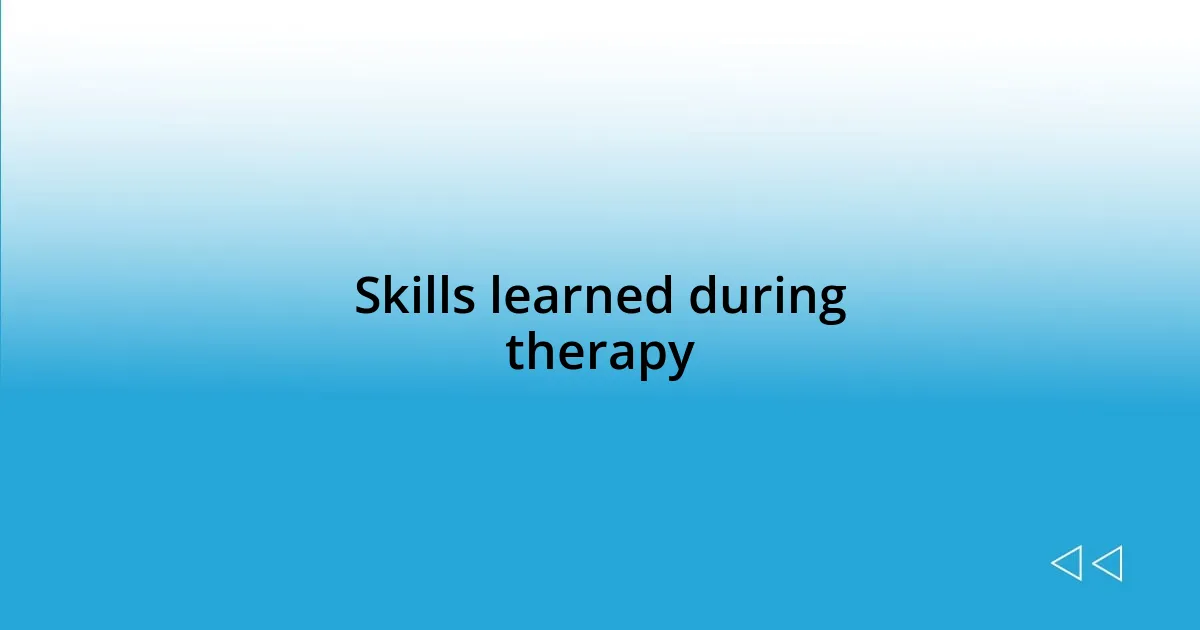
Skills learned during therapy
Learning new skills during DBT sessions transformed my approach to life’s challenges. One skill that stood out for me was ‘mindfulness.’ I deeply remember a morning when I felt overwhelmed by racing thoughts. I practiced a simple breathing exercise, focusing on my inhale and exhale. In that moment, I discovered the power of being present—no longer a slave to my thoughts, but an observer, allowing me to create space between emotional reactions and responses.
Another critical skill I gained was ‘distress tolerance.’ There were times when I found myself in the midst of emotional turmoil, feeling as if I were going to drown in my feelings. I recall using the ‘self-soothe’ technique where I listened to my favorite music and took a warm bath. This simple act transformed my perspective, illustrating that I could take care of myself, even when the world felt chaotic. It was such a relief to realize I didn’t have to panic; I could choose to engage with comforting activities instead.
Through the ‘interpersonal effectiveness’ module, I delved into how to communicate my needs assertively. I still chuckle when I think back to the workshop exercise. We had to use ‘I statements’ to express our feelings, and I fumbled a bit at first. However, by the end, I successfully expressed a need to a friend without feeling guilty. This process reinforced that my needs are valid. Overall, each skill I learned was a tool that reshaped my understanding of myself and my relationships.
| Skill | Description |
|---|---|
| Mindfulness | Focusing on the present moment to manage overwhelming thoughts and feelings. |
| Distress Tolerance | Techniques to cope with emotional pain without resorting to harmful behaviors. |
| Interpersonal Effectiveness | Communicating needs and boundaries assertively and respectfully. |
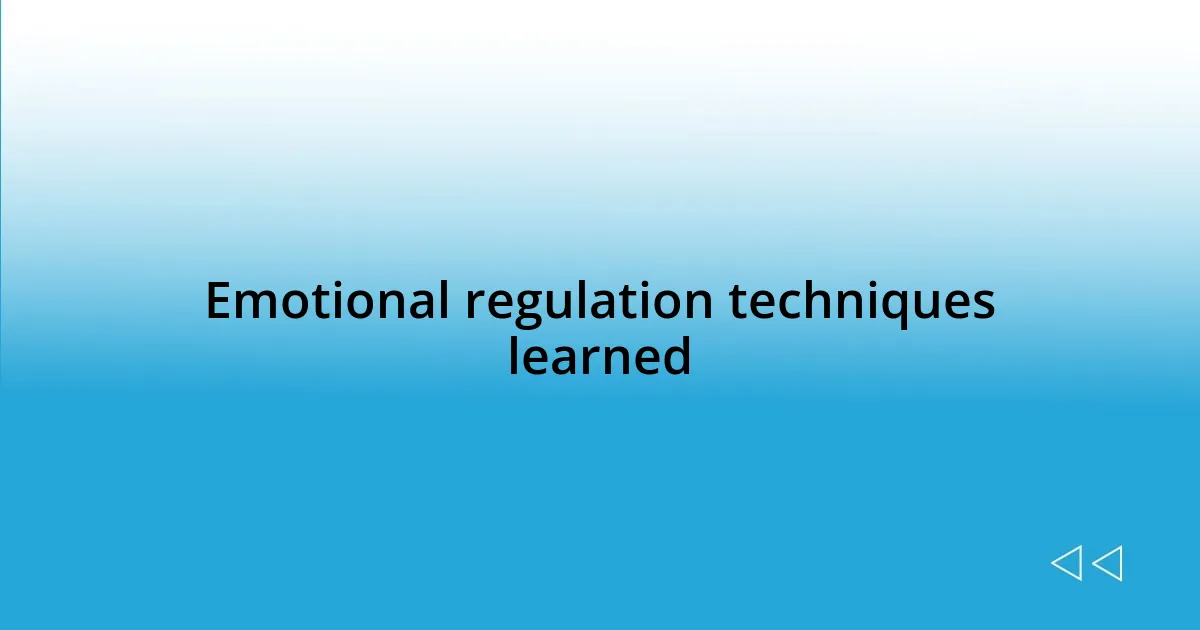
Emotional regulation techniques learned
One emotional regulation technique that really made an impact on me was the practice of ’emotion regulation strategies.’ I remember sitting in a cozy corner of my therapist’s office when she introduced the concept. She explained how identifying and labeling my feelings could help demystify them. It struck me that so often, I would dismiss my emotions as too overwhelming to handle. But in that moment, I learned it was okay to sit with discomfort. A simple ‘I feel anxious’ or ‘I feel sad’ was a powerful starting point for processing those emotions.
Another technique I integrated was ‘opposite action.’ I vividly recall a day when I wanted to isolate myself after a particularly rough week. Instead, I challenged myself to reach out to a friend for a walk. Taking that first step felt monumental. It was amazing to see how shifting my action contradicted my feelings and led to a burst of joy and connection, lifting me out of that dark place. Isn’t it fascinating how simply doing something different can transform your emotional state?
Finally, using the ‘check the facts’ skill became a game changer for me. There was a period when I found myself spiraling into self-criticism after missing a deadline. I took a moment to pause and list out the factual evidence of my situation. Surprisingly, I discovered that the universe hadn’t crumbled; I was still capable and worthy of compassion. By training myself to focus on reality rather than my inner critic’s narrative, I learned to cultivate a more balanced emotional response, turning a harsh self-judgment into an opportunity for growth. Doesn’t it feel liberating to reclaim control over your feelings like that?
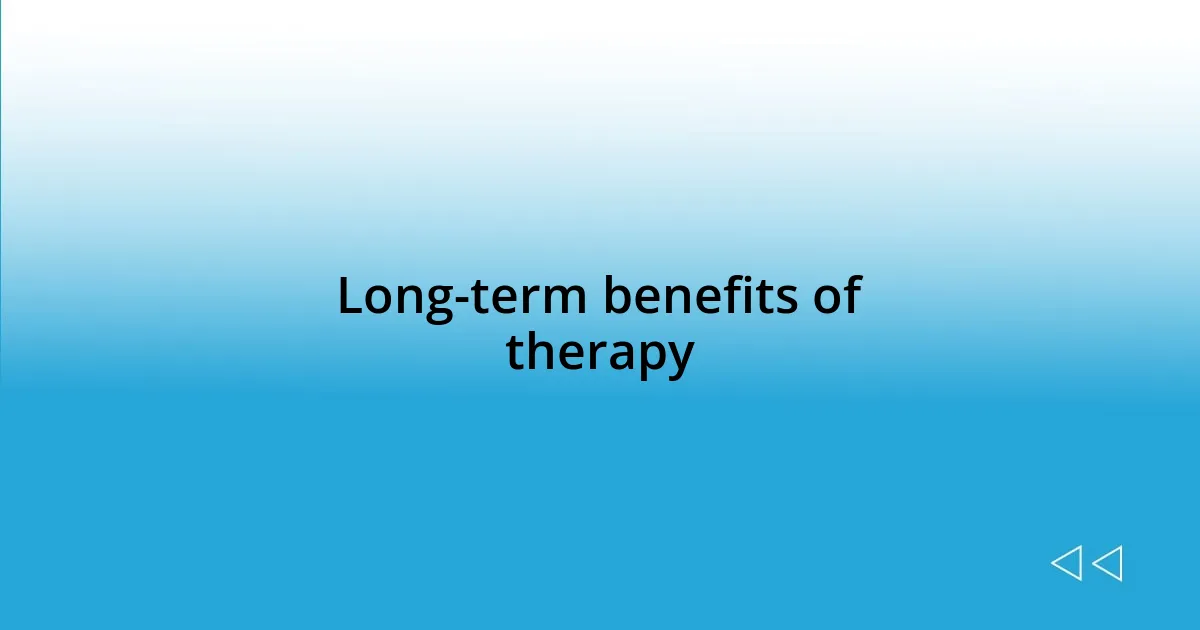
Long-term benefits of therapy
The long-term benefits of therapy extend far beyond the therapy sessions themselves. I remember a few months after completing Dialectical Behavior Therapy (DBT), I was faced with a situation that would typically send me spiraling into anxiety. Instead of succumbing to my old patterns, I instinctively turned to the mindfulness techniques I had practiced. This newfound ability to pause and assess my emotional state is something I continue to use regularly. It’s reassuring to know that I now have tools to navigate life’s ups and downs without losing myself along the way.
Another enduring benefit I’ve noticed is how my relationships have flourished since therapy. Initially, I struggled with vulnerability and often cloaked my needs in fear. Yet, I distinctly recall the first time I openly shared my feelings with a family member after DBT. The conversation was both nerve-wracking and liberating; I felt a sense of connection I hadn’t experienced before. It’s remarkable how being honest and assertive can foster deeper bonds. This experience reinforces my belief that saying what I truly feel can lead to mutual understanding and support.
Over time, these skills have become ingrained in me, shifting the narrative of my life. Each day, I find myself using emotional regulation techniques almost instinctively. When a challenging thought breaches my mind, I no longer engage in a battle but instead check the facts. Just last week, I caught myself being overly critical about a professional setback. By focusing on the reality of my accomplishments, I prevented a downward spiral. Isn’t it fascinating how these simple shifts in perspective, learned during therapy, can create lasting positive changes? The journey continues, but these long-term benefits have undoubtedly built a solid foundation for emotional resilience.





